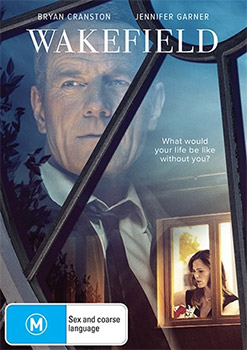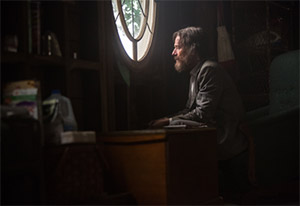Wakefield DVD talking with Robin Swicord

Wakefield
Starring: Bryan Cranston, Jennifer Garner
Producers: Bonnie Curtis, Wendy Federman, Julie Lynn, Carl Moellenberg, Elliot Webb
Written and Directed by: Robin Swicord
Rating: M Sex and coarse language
Runtime: 104 Minutes
Howard Wakefield is a successful New York litigator and a suburban family man. He and Diana Wakefield have been married for fifteen years. Their relationship has declined into petty jealousies and resentments. The couple is only half-aware of feeling disengaged and unfulfilled. One night, Howard is stranded by a power outage on the train as he commutes home. At last he arrives at his house, very late. He's annoyed to spy a raccoon prowling the yard. He follows the raccoon into the attic space above his carriage-house garage. From there, Howard finds that he can look into the family's kitchen, where his wife Diana and young teen daughters clear away the supper dishes. He finds himself reliving an unpleasant quarrel from the night before, which ended badly for Howard. Seeing that his wife is still angry, Wakefield decides to wait in the attic until she goes to bed.
Howard inadvertently falls asleep there. When he wakes, it's dawn, and he's certain that his wife will never believe his story. Not eager to face her accusations, Howard again delays going into the house. The family wakes and begins their work and school day. As one thing leads to another, Howard enjoys watching Diana become increasingly peeved at his absence, and then, soon enough, increasingly concerned. Howard prolongs the drama by staying in hiding for a few more days. As he watches his wife and kids and colleagues deal with his unexplained disappearance, Howard slowly awakens to a new longing.
In a spirit of experimentation, Wakefield decides to remain hidden in the garage attic, surviving by foraging at night. He fashions a living space for himself above the garage, and amuses himself by secretly watching his family and neighbors go about their lives. He learns how to scavenge and maintain his survival, and he becomes adept at hiding, only steps away from the lives of his oblivious family.
Over the next several months, solely through keeping this vigil, Howard begins to close the emotional chasm between his family and himself. His feelings toward his daughters and Diana become tender again. He feels abruptly abandoned by his family when they depart for summer vacation. On his own now, Howard gradually begins to understand that he didn't really leave his wife and children – he's left himself. In a moment of unexpected crisis, Wakefield befriends two mentally-challenged young adults next door. The two young people accept him, in spite of his decrepit appearance; and Howard is forced to trust them.
When his wife and daughters return, Howard finds that he now desperately longs to come home to them. He realizes that he's more in love with Diana than ever. But he's convinced that when Diana learns where he's been keeping himself, of course she'll reject and banish him. Howard can see no way to return home. He does make one impulsive approach, but he loses his courage when, devastatingly, Diana doesn't recognize this now derelict man. Howard reads the evidence: Diana has begun to move on, possibly to another man. Wakefield has no choice. He's now forced to take action. Only by risking everything can he find his way home.
 DIRECTOR'S STATEMENT
DIRECTOR'S STATEMENT
I've loved E.L. Doctorow's writing since I read his first novels, in my twenties: Hard Times and The Book of Daniel, then Ragtime. Doctorow seems to saunter around inside America's history, reaching into distant decades and pulling forward what feels like a modern story. His characters hook me, always. They're instantly knowable, and as contemporary as I am – they just happen to live in this other time.
Doctorow's short story 'Wakefield" takes place now, in the suburbs of New York: A businessman arrives home from work one night, and doesn't enter his house. On impulse, he hides himself in the attic of his detached garage, and keeps vigil there, secretly observing the effect of his disappearance on his wife and family; and exploring his own estrangement, from his family, and from himself.
When I first encountered his character, Howard Wakefield, in The New Yorker in 2008, I felt that familiar Doctorow hook: That sensation of You know me. But I didn't know Howard Wakefield. He bewildered me; even disgusted me, slightly. Why would this man do such a thing to his family?
To me Wakefield's actions seemed rooted in privilege: A man who's lived with a surfeit of good fortune, who's never had anything bad happen to him, a man protected by money and education and Anglo-Saxon heritage, one day capriciously decides to invite disaster. To what end, I wondered? An idea of self-annihilation seemed to hover over the story. Was he punishing himself? For what crime?
I found myself thinking more about Doctorow's short story. What would really happen to a man like Wakefield if he abruptly gave up his domesticated life, and plunged into the nocturnal suburban wilds?
Initially he'd probably keep himself busy, I speculated, in a Ten-Habits-of-an-Effective-Manager sort of way. He'd nest in the attic, replicating the comforts of home. He'd develop clever strategies for scavenging 'clean garbage" at night, from, say, the village bakery. Howard being Howard, even scrounging in a dumpster, he might set up a 'workplace rival" for himself, like his nemesis back at the firm. He'd feel pretty omniscient up there in the attic, self-amusing with sardonic commentary as he watched his wife and kids go through their predictable stages of loss.
But eventually self-amusement wears itself out. My interest quickened. That's when Howard Wakefield would step into himself, and discover an unmapped wilderness. What's in that wilderness?, I thought. And, How do you photograph the inner journey? As I began to make notes, a phrase came to me: 'Hide, and seek."
My friend the producer Elliot Webb introduced me to Edgar Doctorow. Doctorow and I spoke at length about my interest in adapting his short story.
I wanted to make a film that fairly closely followed his story, yet would allow me to explore my own questions about Howard Wakefield. I was teasing out thematic threads that intrigued me, about marriage and identity. Doctorow pointed me to the source that had inspired him: Nathaniel Hawthorne's short story 'Wakefield," set in London, in which a man disappears from his own settled life, with no explanation; then lingers in a boarding house across the street to watch what happens. In the story, Hawthorne extends a casual invitation: 'If the reader choose, let him do his own meditation; or if he prefer to ramble with me… I bid him welcome."
A hundred and seventy years later, E. L. Doctorow took him up on the offer, and wrote his version of 'Wakefield" with a free hand. I'll always be grateful to Doctorow for his same generosity of spirit, when he urged me to approach the film as my own 'meditation," and not fear that he'd take offense to anything I invented. He also offered his story rights gratis, deferring compensation until we were headed to production. To me, Edgar's extraordinary generosity helped set the DNA of our little enterprise, or at least it seems that way now.
The one actor I desperately wanted, the actor whose name I'd written first at the very top of a terrifyingly short list – my perfect choice, Bryan Cranston, eventually said yes. Not only did he say yes to the challenges of a small indie production (20 shooting days!), but he committed to us a year and a half in advance, which allowed my producers Julie Lynn and Bonnie Curtis time to pull together our brave consortium of private financiers. I am still moved by Bryan's faith in us – especially since his opening words to me after reading the script weren't exactly words, but more like gallows laughter, followed by, 'This is a strange movie."
And actually, those were the same words Jennifer Garner used at our initial meeting. I launched into my plea for Jen to take the role of Diana Wakefield. I pointed out that though Jennifer would rarely speak in the film, she'd have ample opportunity to be naked in front of a window. Jen's reply: 'Getting to play a character who's living a full and complete life inside the house, who the audience gets to see, yes, but only through a window, and they never hear her voice – that's exactly what I love about this part." Now, that's a generous actor.
For a director, getting to watch Jennifer work on set is like opening a present all day every day. She's solid and luminous and truthful. If Jennifer's super power is her authenticity, Bryan's is his playfulness. He finds the opportunity for invention in every moment. In the editing room, I could sometimes hear my own surprised laughter on the sound track, muffled, during some of Bryan's takes. He's funny, heartbreaking, and endlessly, compellingly original.
From our first rehearsal through the final cut of the film, Bryan was my collaborator and co-conspirator. It's impossible for me to imagine making this film with anyone else.
- Robin Swicord, Writer & Director
Wakefield available on DVD 5th September, 2017
MORE



